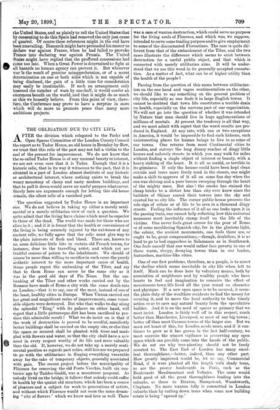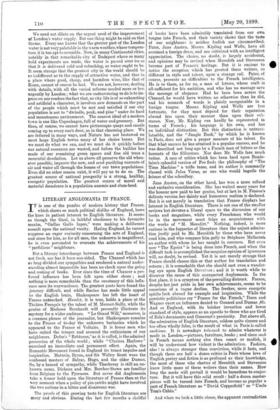THE OBLIGATION DUE TO CITY . LIFE, FTER the division
which relegated to the Parks and Open Spaces Committee of the.London County Council the report as to Tudor House, an old house in Bromley-by-Bow, We trust that this relic Of the past may not' fall a victim to the zeal of the present for improvement. We do not know that the so-called Tudor House is of any unusual beautyor interest, we are not even sure that it is Tudor. Enough that it is a historic relic, that in its way it witnesses to the past, that it is sitifated in a part of London almost deetitute of any historic or architectural interest, where nothing exists to bieak the weary monotony of .cheap and nasty, modern buildings, and that to pull it down would serve no useful purpose whatsoever. Surely here are arguments enough for letting this old house remaik.the silent relit-of a vanished .past. . .. • • The question suggested by Tudor House is an important One: We de not believe in taking up either a merely senti- mental or a merely utilitarian view of such a question. We quite admit that the living have claims which must be superior to those of the dead. The world was made for those who are alive in it ; and if it is found that the health or convenience of the living is being seriously injured by the existence of any ancient relic, we fully agree that the relic must give way to the :plain interests of :flesh and blood. There are, known to us, some delicious little bits in" certain old French towns, for instance, dear to the travelling artist, and which yet are fruitful sources of poison to the inhabitants. We should of course be more than willing to sacrifice in such cases the purely sthetic interest . to the more important • comae of " health. Some people regret the embanking of the Tiber, and say that to them Rome can never be the same city as it NN'ELS in the good old days of Pio Nono. But the em- banking of the Tiber and other works carried out by the Romans have made of .Rome a 'cityWith the same death-rate as .London,=that is to say, One of the most, instead of one of the least, healthy cities in Europe. When Vienna carried out her, great and magnificent series of improvements, some vener- able Objects were destroyed. But who that walks to-day along the splendid ;" Ring," with its palaces on either hand, will regret that a little PiCturesque dirt has been sacrificed to pro- dike this admirable result I What we do insist on is that if the work Of destruction is proved' to be needful; ininifestly better buildings shill be erected on the empty site, Or else that tbe', space so secured shall, be planted, with .tieee and made glad with flowers and water, so that the city shall have a new asset in every respect worthy of its life and more valuable than the-old. If, however, we do not take up a merely senti- mental position as regards past relics, still less are we prepared tb; go mith: the utilitarians in flinging everything venerable away for the sake of temporary objects; generally associated with gain: The, recent, project. before the municipality of Florence for removing the old Ponte Vecchio,. built -six ceO- tunes: ago by-Taddee.Gadcli..waa a monstrous -proposal. As nobody lived off the bridge,-it follows that nobodycould suffer in health byiht old' structure; Which his been a source of. pleasure and. a subject. for work to generations of artists, and without which Florence would not seem the same dream- ing "city of flowers" which we know and love so well. There was a case of wanton destruction, which could serve no purpose for the living souls of Florence, and which was, we suppose, intended to serve some trading purpose and to give employment to some a the discontented Florentines. The case is quite dif- ferent from that of the embankment of the Tiber, and the two cases illustrate the difference which seems to exist between destruction for a useful public object, and that which is connected with merely utilitarian aims. It will be under- stood that we use this word in its generally accepted connota- tion. As a matter of fact, what can be of higher utility than the health of the people ?
Passing from the question of this mean between utilitarian- ism on the one hand and vague sentimentalism on the other, we should like to say something on the general problem of city life, especially as one finds it in large English towns. It cannot be doubted that town life constitutes a terrible drain on health, especially on the nervous part of our organisation. We will not go into the question of whether it was intended by Nature that man should live in huge agglomerations of millions of mortals. At present the tendency is all that way, and we must admit With regret that the worst results are pro- duced in England. At any rate, with one or two exceptions in America, it would be impossible to find such hideous, such uninteresting places for human beings to live in as some of our towns. One returns from most Continental cities to London, and surveys the long dreary reaches of dingy little houses and unlovely streets in which you may walk for miles without finding a single object of interest or beauty, with a heavy sinking of the heart. It is all so sordid, so terrible-in its griminess. If only the houses could have been kept clean outside and trees more freely Used in the streets, one might - make a shift to approve of it all on some fine day when the sun was shining and a pure breeze sweeping through the heart of the mighty mass. But alas ! the smoke has stained the cheap bricks to a dirtier hue than city ever knew since the builders of Shinar reared their, towers into the sky and created for us city life. The corner public-house presents the sole sign of colour or of life to be seen in a thousand dingy streets. Feeling the influence of it all as one looks upon it in the passing train, one cannot help reflecting how this universal meanness must inevitably stamp itself on the life of the victims. One never feels great sorrow for the poor of Rome or.of some mouldering Spanish city, for in the glorious light, the colour, the ancient monuments, one feels there are, or ought to be, great compensations,—though, doubtless, it is as hard to go to bed supperless in Salamanca as in Southwark. One feels oneself that one would rather face poverty in one of those warm, sleepy, decaying towns than in our leaden, featureless, machine-like cities.
One of our first problems, therefore, as a people, is to arrest the decline which seems inevitable in city life when left to itself. Much can be done here by voluntary means, both by association of neighbours and by wealthy people who have hearts to feel and imagination to conceive the effect, of monotonous town life lived all the year round on character and physique. If a new open space is to be secured, it seems the plain duty of the wealthier residents to find the money for securing it, and to move the local authority to take timely action so as to save any natural -beauty from the speculative builder. And it is on the need of spaces as primary that we most insist. London is fairly well off in this respect, much better than Manchester, Liverpool, or most of our big towns ; better off than-most German towns of the larger size. But we must not boast of this, for London needs more, and if it con- tinues to grow as it has grown in the last .half-century, we must exercise the utmost vigilance in preserving any open space which can possibly come into the hands of the public. We. do not see why tree-planting should not be freely resorted to. The East End of London has many excel- lent thoroughfares,—better, indeed, than any other part. How greatly imikoved. would be, let us say, Commercial Road, if it were planted all the length with shady trees, as are the poorer boulevards in Paris, such as the Boulevards Menilmontant and Voltaire. The ,same would bold .good, of all, the great thoroughfares, leading into the suburbs, as those to 'Brixton,' Hampstead, Wandsworth, Clapham. No more wanton folly is committed in London suburbs than by cutting down trees when some new building estate is being "opened up." We need not dilate on the urgent need of the improvement of London's water supply. But one thing might be said on that theme. Every one knows that the greater part of the London water is not very palatable in the warm weather,whose tempera- ture it is too apt to resemble. Now, in many Continental cities, notably in that remarkable city of Budapest where so many bold experiments are made, the water is passed over ice so that it is delivered cold and refreshing, as water ought to be. It seem strange that the greatest city in the world should be so indifferent as to the supply of attractive water, and that in a place where good, cheap, and harmless wine, like that of Rome, cannot of course be had. We are not, however, dealing with details, with all the varied reforms needed more or less urgently by London ; what we are endeavouring to do is to im- press on our readers the fact that, as city life is of so exhausting and artificial a character, it involves new demands on the part of the people which must be met and satisfied if our city population is not to "dwindle, peak, and pine" under its hard and monotonous environment. The nearest ideal of a modern town is one like Copenhagen, full of water and greenery. But then, of course, we cannot have picturesque quays and canals coming up to every one's door, as in that charming place. We are fettered in many ways, and Nature has not bestowed on most large English towns many of her choice boons. But we must do what we can, and we must do it quickly before our natural resources are wasted, and before the builder has made of our remaining green spaces and fine old trees a mournful desolation. Let us above all preserve the old when- ever possible, improve the new, and send purifying currents of air and water all through the homes of our town populations. Even did no other reason exist, it will pay us to do so. The greatest source of national prosperity is a strong, healthy, energetic population. The greatest source of moral and material decadence is a population anemic and slum-bred.







































 Previous page
Previous page